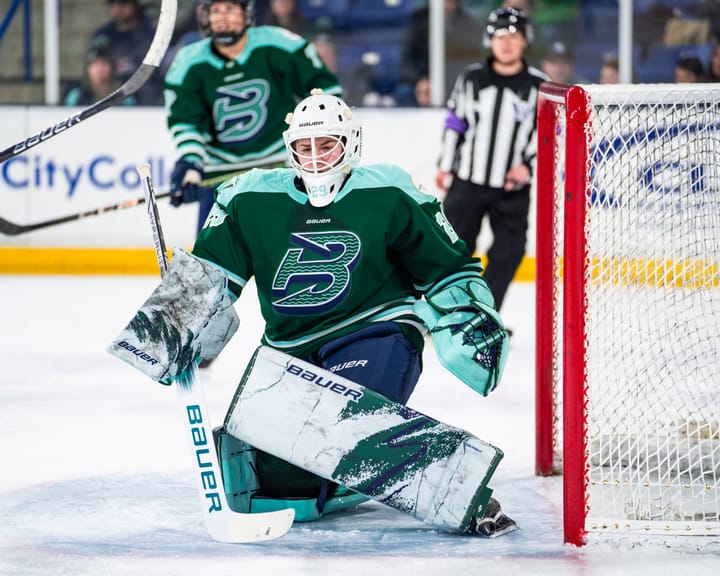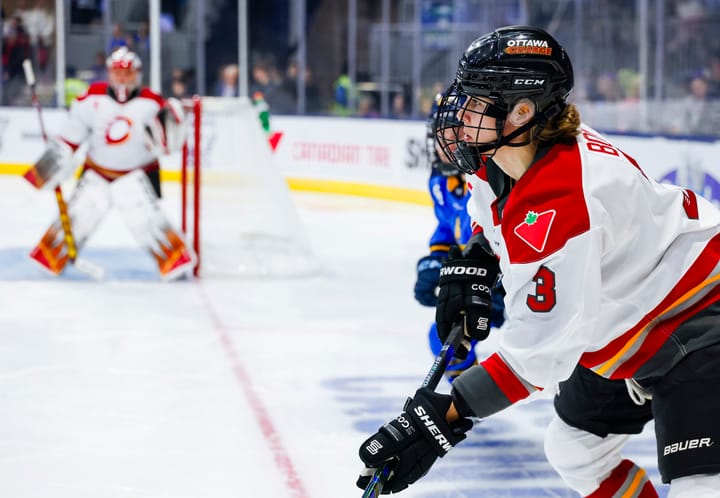Rewind: Monique Lamoureux’s dominance at the 2012 Worlds
The Lamoureux line was on pace to make history right up until it wasn’t
We’ve seen a lot of unforgettable performances on the big stage of the IIHF World Championship over the years.
Over the last decade, no player has stolen the show more often than Team USA’s Hilary Knight. Since 2011, Knight has led the Worlds in scoring four out of a possible seven times and has twice been crowned MVP. But, the single greatest individual performance in the last 10 years of Worlds competition doesn’t might not belong to her. Instead, one could make a case that it belongs to Monique Lamoureux-Morando.
After four players — Cindy Curley, Tina Cardinale, Cammi Granato, and Kim Urech — scored at least 14 points at the inaugural IIHF Worlds in 1990, only four women have achieved that feat: Hayley Wickenheiser (2007), Knight (2011), and Monique Lamoureux-Morando (2012). That’s some elite company.
To put it simply, Lamoureux-Morando went on a tear in Burlington, Vermont in 2012. Let’s hit rewind and watch some magic from one of the best lines in the history of the women’s game.
Burning Canada
It’s not unusual for players on Team USA or Canada to pile up points against lesser opponents at the Worlds and the Olympics. Lamoureux-Morando shocked the world by bullying her way all over the scoresheet against Team Canada in the group stage to the tune of three goals and three assists in a 9-2 rout. Against Canada.
Yes, that’s six points in a single game — against Canada.
Games between the U.S. and Canada are typically closely-fought wars of attrition that come down to which team is able to capitalize on rare mistakes made by the opposition. These games are never this lopsided. Since Lamoureux-Morando’s six-point salvo against Canada on Apr. 7, 2012, no game between the two powerhouses at the Worlds or Olympics has been decided by more than two goals and six of those meetings have required overtime and/or the shootout to decide a winner.
The Lamoureux twins and Kelli Stack were all over Canada. USA’s eternal rivals simply had no answer for them. As a trio, they finished the game with five goals and 15 of the U.S.’s 33 shots.
Chasing History
All eyes were on the Lamoureux line and Team USA after that statement victory against Canada. As if a six-point game against Canada wasn’t impressive enough, Lamoureux-Morando repeated that feat against Finland in USA’s 11-0 victory on April 11. That second offensive outburst came in the wake of a two-point game against Russia on April 8.
It’s hard to put into words just how good the Lamoureux line was in the group stage of the 2012 Worlds. The unparalleled speed and vision and Stack was the perfect compliment to the uncontainable will and sometimes supernatural instincts of the twins. All three players were at the height of their powers. It was a sight to behold.
“It’s a blast,” Lamoureux-Morando said three games into the tournament. “Kelli adds a different aspect to our line. Joce and I are more north-south players, more power forwards than finesse. She adds that extra thing to our line. She’s fast, drives wide and always seems to have time to make a play with the puck.”
To get an idea of what opposing teams had to deal with, take a look at this goal by Stack against Finland. With two Finns closing on her, Lamoureux-Morando hit Stack with a tape-to-tape pass in the neutral zone at center ice. Jocelyne Lamoureux-Davidson jumps into the zone and goes wide left to force the right side defender to play the pass and Kelli Stack does the rest. It’s the kind of hockey that belongs in a frame hanging on a gallery wall.
After three games of group play, Lamoureux-Morando had seven goals, seven assists, 15 shots on goal, and was a staggering +10. The twins and Stack were buzzing and Lamoureux-Morando was on pace to become the second player ever to eclipse 20 points at a Worlds tournament. She even had a chance of catching Cindy Curley’s 23 points, but it was a long shot. “We figured out their line was scoring every three shifts,” University of North Dakota head coach Brian Idalski said after USA crushed Finland. “That’s ridiculous.”
It was absolutely ridiculous. It was also unsustainable.
The U.S. continued their blistering scoring pace with a 13-0 rout at the expense of Switzerland in the semifinal on April 13. But, somehow, Lamoureux-Morando went scoreless despite putting six shots on net and her sister and Stack both finishing with two-point games. And, just like that, her chances of making history went up in smoke.
Derailed into Disappointment
Lamoureux-Morando entered the gold medal against game against Canada with 14 points in four games. The goal had never been for her to make history; it was to come home with gold. Still, it was all but inevitable that she would be named the Best Forward of the Worlds for a second-straight year. She got the nod at the 2011 Worlds after scoring two goals and earning five assists in just three games.
But, hockey can be cruel. On April 14, 2012, it was especially cruel to the U.S. and the Lamoureux line.
One week after the lopsided 9-2 result in group play, the Canadians brought the U.S. to overtime after Meghan Agosta buried a power-play goal with 2:38 left in regulation. The Lamoureux line was held scoreless and had taken four combined penalties in regulation, but many looked to them to settle the game in overtime. Surely, the trio that had taken the tournament by storm had one last bit of magic left in the tank. But it never came. Just shy of two minutes into sudden death, Caroline Ouellette beat Molly Schaus to win Canada its first gold in Worlds competition since 2007.
Ouellete’s goal erased Canada’s embarrassing defeat in the group stage and Lamoureux-Morando’s run at making history from everyone’s memory. Stack was named the tournament’s Best Forward — deservedly so, she had 13 points of her own — and Lamoureux-Morando got the nod as a media All-Star. Somehow, after averaging 10.5 goals per-game through the semifinals, USA went home with a silver medal.
Perspective
Since 2012, no player has scored 13 points in a single Worlds tournament, let alone 14. Marie-Philip Poulin, Brianna Decker, Kendall Coyne Schofield, and Knight all hit 12, but no one has come as close to chasing down history as Lamoureux-Morando did. Of course, Knight scored 14 points at the 2011 Worlds, but that doesn’t diminish what her teammate did a year later. It’s also worth noting that seven of Lamoureux-Morando’s points in 2012 were goals; Knight scored five goals in her 14-point performance. And that M-Lam’s biggest games came against Canada and Finland.
In April 2012, Monique Lamoureux-Morando played savagely, skillfully, and spectacularly, and the sport was better for it.
All data courtesy of IIHF.com and HerHockeyCounts.com.





Comments ()